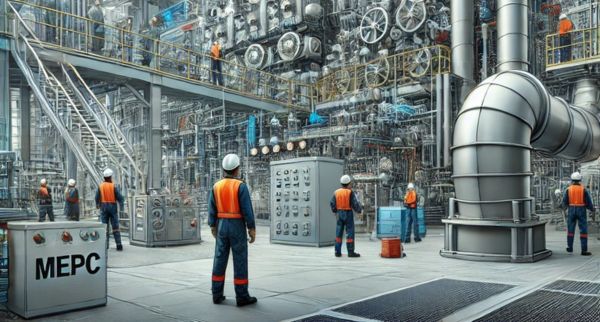Introduction
In industrial environments, the importance of Mechanical, Electrical, Plumbing, and Civil (MEPC) services cannot be overstated. These services ensure the smooth functioning of critical operations, from HVAC systems that regulate temperatures to electrical systems that power equipment. Given the scale of industrial facilities, even minor disruptions in any MEPC component can lead to significant downtime and financial losses.
This blog explores how MEPC services contribute to the efficiency, safety, and sustainability of industrial facilities, covering HVAC, electrical, and plumbing solutions and how innovations in these areas drive long-term operational savings.
1. HVAC Systems and Industrial Efficiency
Heating, Ventilation, and Air Conditioning (HVAC) systems are essential to maintaining an optimal working environment in industrial facilities. Whether in factories, warehouses, or production plants, temperature control is necessary for both employee comfort and operational processes.
- Heating, Ventilation, and Air Conditioning (HVAC) systems are essential to maintaining an optimal working environment in industrial facilities. Whether in factories, warehouses, or production plants, temperature control is necessary for both employee comfort and operational processes.
- Energy Efficiency: Industrial HVAC systems, if not properly maintained, can lead to excessive energy consumption. Solutions such as smart thermostats, variable speed fans, and predictive maintenance help minimize energy waste.
- Ventilation and Air Quality: Proper ventilation ensures that industrial by-products such as dust, fumes, and gases are efficiently removed. Good air quality helps protect the workforce and ensures compliance with safety regulations.
Investments in energy-efficient HVAC technologies can significantly reduce operational costs while enhancing worker productivity and equipment reliability.
2. Electrical Power Systems: Ensuring Uninterrupted Operations
Uninterrupted power is the lifeblood of any industrial facility, as a sudden power outage can halt production lines and disrupt supply chains. Electrical systems within MEPC services focus on power distribution, control systems, backup solutions, and monitoring technologies.
- Reliable Power Distribution: Industrial facilities often operate multiple high-powered machines simultaneously. A well-designed electrical system ensures safe and consistent power delivery to all units.
- Energy Monitoring and Load Management: Through energy management systems, companies can monitor power usage in real-time, identify inefficiencies, and reduce energy costs. Automated load management systems balance power usage during peak and off-peak hours to avoid surges.
- Backup Solutions: Unplanned outages can cost industries millions in downtime. Generators, UPS (Uninterruptible Power Supply) systems, and microgrids provide essential backup power during grid failures, preventing production losses.
Modern electrical systems are also evolving with renewable energy integration, such as solar or wind power, helping industries reduce dependency on fossil fuels and meet sustainability goals.Investments in energy-efficient HVAC technologies can significantly reduce operational costs while enhancing worker productivity and equipment reliability.
3. Advanced Plumbing Solutions for Industrial Operations
Efficient plumbing systems are critical for the seamless operation of industries, particularly in sectors like manufacturing, pharmaceuticals, food processing, and chemical production. These industries rely heavily on water supply, wastewater management, and recycling systems to ensure smooth operations.
- Water Supply Systems: A consistent water supply is essential for cooling, cleaning, and various manufacturing processes. MEPC services focus on designing efficient pipelines to prevent water loss and maintain flow.
- Wastewater Management: Industrial processes generate significant wastewater, which must be treated before disposal to meet environmental standards. Modern plumbing systems incorporate recycling technologies and filtration units to ensure compliance with wastewater regulations.
- Smart Plumbing and Leak Detection: Plumbing systems equipped with IoT-enabled sensors can detect leaks and anomalies in real time, preventing costly water damage and ensuring uninterrupted operations.
Innovative plumbing solutions not only improve operational efficiency but also help industries achieve water conservation goals, essential for sustainable operations in regions with water scarcity.
4. The Synergy of MEPC Services for Industrial Success3. Advanced Plumbing Solutions for Industrial Operations
The true power of MEPC services lies in the seamless integration of mechanical, electrical, plumbing, and civil engineering components. In an industrial setting, these systems must work together efficiently to ensure smooth operations. Here’s how MEPC synergy delivers value:
- Operational Reliability: Well-maintained MEPC systems reduce the risk of downtime by ensuring every component functions optimally.
- Compliance with Regulations: Industries are subject to strict environmental and safety regulations. MEPC services help ensure facilities remain compliant, minimizing legal and financial risks.
- Sustainability and Innovation: Innovations in MEPC, such as smart monitoring systems, renewable energy integration, and modular HVAC solutions, contribute to sustainable operations while reducing operational costs.
By addressing these critical aspects, MEPC services offer industries the ability to adapt to evolving challenges, such as environmental sustainability and digital transformation.
5. Operational Savings through MEPC Innovations
Innovations in the MEPC domain are helping industries achieve significant operational savings. Some examples include:
- Predictive Maintenance Systems: Advanced sensors and data analytics tools predict equipment failures, reducing the need for reactive maintenance and avoiding costly downtime.
- Energy-Efficient Technologies: The adoption of LED lighting, energy-efficient motors, and renewable energy systems lowers energy bills over time.
- Water Recycling Systems: Plumbing innovations reduce water consumption and treatment costs by recycling wastewater for reuse in non-critical processes.
These innovations not only enhance efficiency but also align with broader corporate sustainability goals, such as reducing carbon footprints and optimizing resource usage.
Conclusion
In industrial facilities, the role of MEPC services extends far beyond installation and maintenance; they are fundamental to the safety, efficiency, and long-term sustainability of operations. With industries under constant pressure to reduce costs, meet environmental standards, and enhance productivity, the demand for innovative MEPC solutions is higher than ever.
By integrating smart technologies, renewable energy sources, and sustainable practices, MEPC services enable industries to stay competitive in a rapidly evolving landscape. Companies that prioritize efficient MEPC services not only ensure uninterrupted operations but also unlock opportunities for long-term operational savings and environmental responsibility.
Investing in MEPC services today is an investment in the future of industrial operations, offering resilience, efficiency, and sustainability for the challenges ahead.

